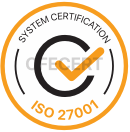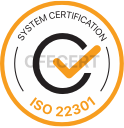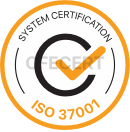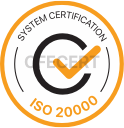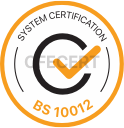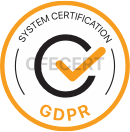ISO/IEC 20000 Information Technologies Service Management System
ISO / IEC 20000 Service Management System is the best practice that helps you provide a consistent and reliable service. In the ever-changing global business environment, the success of the organisation depends on its ability to outperform others. It is important for organisations to be adaptable and leverage the latest processes to stay competitive.
High-quality service is essential in any industry and IT services are no exception. Customers won’t be kind to downtime, slow performance, and delayed requests, so you need to do your best to keep things running as smoothly as possible. Therefore, the globally recognised IT service management standard – ISO/IEC 20000, Information Technology Service Management System (ITSMS) will ensure that the IT services that your company deliver will be of satisfactory quality. ISO/IEC 20000 outlines the requirements for setting up the management system and best practices for managing a company’s IT service and system, making it more cost-effective, reliable, consistent and efficient.
ISO 20000 Awareness Training
Course Aim
ISO / IEC 20000-1: 2018 Lead Auditor training enables you to develop the expertise required to perform a Service Management System (SMS) audit by applying widely recognized audit principles, procedures and techniques. During this training, you will gain knowledge and skills to plan and conduct internal and external audits in accordance with ISO 19011 and ISO / IEC 17021-1 certification process. Based on practical applications, it is aimed that you can specialize in audit techniques and have the competence to manage an audit program, audit team, communication with customers and conflict resolution.
Who should attend?
- Personnel responsible for the implementation and management of the ISO / IEC 20000-1: 2018 management system,
- Information security consultants,
- Employees in IT departments,
- Those who work in the field of computer technologies, management information systems, software systems and software development technologies and want to install this system in their institutions
Course Content
- IT Service management basic definitions and concepts,
- Development of IT service management from ITIL to ITSMS,
- Planning and implementation of service management,
- The requirements of the ISO / IEC 20000-1 service management system standard,
- SLA management, service continuity management, capacity management, information security management and reporting in the service process,
- Customer relations and supplier relationship management,
- Incident and problem management,
- Configuration management, change and version management,
- Certification preparation studies,
- Audit processes
You can download the training brochure for detailed information.
ISO 20000 Implementation Training
Course Aim
ISO / IEC 20000-1: 2018 is an internationally recognized standard for a service management system. It supports the management of the service lifecycle, including planning, design, migration, delivery and improvement of services to meet targeted requirements, thereby providing value for customers, users and service providers.
By participating in this training, you will discover how to implement an ISO / IEC 20000-1: 2018 based Service Management System (SMS). With the support of our expert staff, you will learn how to develop an implementation plan, create the necessary documents and implement your SMS.
Who should attend?
- Personnel responsible for the implementation and management of the ISO / IEC 20000-1: 2018 management system,
- Information security consultants,
- Employees in IT departments,
- Those who work in computer technologies, management information systems, software systems and software development technologies and want to install this system in their organisations.
Course Content
- Interpreting the basic concepts and requirements of ISO / IEC 20000-1: 2018 from an application perspective,
- Determining the advantages specific to your organization regarding an effective SMS implementation,
- Creating and implementing an action plan according to the basic requirements of ISO / IEC 20000-1: 2018,
- Developing the skills to make your own basic assessment of your organization’s current position on ISO / IEC 20000-1,
- SLA management, service continuity management, capacity management, information security management and reporting in the service realization process,
- Customer relations and supplier relationship management,
- Incident and problem management,
- Example activities,
- Certification preparation studies,
- Preparing for the third-party audit and certification,
You can download the training brochure for detailed information.
ISO 20000 Lead Implementer
Course Aim
ISO / IEC 20000-1: 2018 Lead Auditor training enables you to develop the expertise required to perform a Service Management System (SMS) audit by applying widely recognized audit principles, procedures and techniques. During this training, you will gain knowledge and skills to plan and conduct internal and external audits in accordance with ISO 19011 and ISO / IEC 17021-1 certification process. Based on practical applications, it is aimed that you can specialize in audit techniques and have the competence to manage an audit program, audit team, communication with customers and conflict resolution.
Who should attend?
- Auditors who want to conduct and manage Service Management System (SMS) certification audits,
- Managers or consultants who want to master the service management system audit process,
- Persons responsible for maintaining SMS requirements,
- Technical experts who want to prepare for a service management system audit,
- Expert consultants in service management
Course Content
- The role of planning, conducting, reporting and monitoring an SMS audit according to ISO 19011 and ISO / IEC 17021
- Advantages of ISO / IEC 20000-1 Service Management System (SMS)
- Correlation between ISO / IEC 20000- 1, ISO / IEC 20000-2 and other standards and regulatory frameworks,
- Understanding service-based thinking, leadership and process management practices,
- Interpreting the previous study,
- The role of an auditor in the context of ISO 19011,
- Audit types,
- Laws and other requirements,
- Accreditation and certification,
- Benefits of accreditation,
- Auditor characteristics,
- Examination process,
- Audit scope and audit objectives,
- Selection of auditors and creating an audit team,
- Stage 1 and 2 examinations,
- Audit planning,
- Preparing a list of questions,
- Opening and Closing meeting,
- Conducting an audit interview,
- Determining nonconformity,
- Examination review,
- Recording and reporting nonconformity,
- Audit reporting,
- Follow-up audits and corrective actions
- Exam information and course review
- Exam
You can download the training brochure for detailed information.
ISO 20000 Internal Auditor Training
Course Aim
ISO / IEC 20000-1: 2018 specifies requirements for an organization to establish, implement, maintain and continually improve SMS. These requirements include planning, design, migration, delivery, and improvement of services to meet service requirements and provide value for customers, users and the organization that provides the services.
Internal audit is an essential element of an effective Service Management System (SMS), and by participating in this course you will develop auditing skills that will help improve your organization’s SMS performance. You will learn how to audit and report the compliance and effectiveness of an SMS based on ISO / IEC 20000-1: 2018. You will also gain the skills to initiate an audit, prepare and run audit activities, compile and distribute audit reports, and complete follow-up activities.
Who should attend?
- It is intended for anyone participating in the audit, maintenance or audit of an SMS based on ISO / IEC 20000-1;
- First party / internal auditors, those who coordinate internal audit activities, or those who are interested in monitoring the effectiveness of their organization’s service management system (SMS).
- Second-party auditors can also benefit from attending this training for existing internal auditors who want to refresh their skills.
Course Content
- Describing the guidelines for management system audit according to ISO 19011,
- Implementing the 19011 guidelines to ISO / IEC 20000-1: 2018 audit,
- Integration of SMS audits with those for other management systems,
- Implementing the requirements of ISO / IEC 20000-1: 2018 in the context of an audit,
- Planning the internal audit,
- Preparing for internal audit,
- Reporting the internal audit,
- Performing internal inspection,
- Internal audit closure
This education; It includes presentations, group work and role exercises.
You can download the training brochure for detailed information.
ISO 20000 Lead Auditor Training
Course Aim
ISO / IEC 20000-1: 2018 Lead Auditor training enables you to develop the expertise required to perform a Service Management System (SMS) audit by applying widely recognized audit principles, procedures and techniques. During this training, you will gain knowledge and skills to plan and conduct internal and external audits in accordance with ISO 19011 and ISO / IEC 17021-1 certification process. Based on practical applications, it is aimed that you can specialize in audit techniques and have the competence to manage an audit program, audit team, communication with customers and conflict resolution.
Who should attend?
- Auditors who want to conduct and manage Service Management System (SMS) certification audits,
- Managers or consultants who want to master the service management system audit process,
- People responsible for maintaining compliance with SMS requirements,
- Technical experts who want to prepare for a service management system audit,
- Consultants in service management
Course Content
- The role of planning, conducting, reporting and monitoring an SMS audit according to ISO 19011 and ISO / IEC 17021
- Advantages of ISO / IEC 20000-1 Service Management System (SMS)
- The relation between ISO / IEC 20000-1, ISO / IEC 20000-2 and other standards and regulatory frameworks,
- Understanding service-based thinking, leadership and process management practices,
- The role of an auditor in the context of ISO 19011,
- Examination types,
- Laws and other conditions,
- Accreditation and certification,
- Benefits of accreditation,
- Those who have a role in audits and their responsibilities
- Auditor characteristics,
- Audit scope and audit objectives,
- Selection of auditors and creating an audit team,
- Stage 1 and 2 examinations,
- Audit planning,
- Preparing a list of questions,
- Opening and Closing meeting,
- Conducting an audit interview,
- Determining nonconformity,
- Audit review,
- Recording and reporting nonconformity,
- Audit reporting,
- Follow-up audits and corrective actions
- Exam information and course review
- Exam
You can download the training brochure for detailed information.
ISO 9001 Quality Management System
Quality Assurance standards for companies concerned with all aspects of manufacturing, from product development and design to production, product installation and operation, and service operations. ISO 9001 Quality Management System helps organizations that want to produce a product/service that meets customer expectations and, more importantly, to create a competitive advantage by ensuring its continuity. To run an organization successfully, it is necessary to manage and control the organization in a systematic and transparent way. Success comes from the implementation and maintenance of a management system designed to continuously improve performance.
The ISO 9001 standard is an international standard that is applied as a quality management system model all over the world. In an ISO 9001 certified organization, every problem is seen as an opportunity for improvement. More important than solving the problem is to ensure that it is not repeated. It is possible for an enterprise to spread the understanding of quality to the base, to know how to reduce costs, to see how it is possible to increase market competition with an effective ISO 9001 certification structure.
ISO 9001 Awareness Training
Course Aim
This course will provide an overview of the high-level structure, risk-based thinking, organisational context, leadership, planning, operation, support, performance evaluation and improvement as set out in the International Standard. It will raise awareness and understanding of the main requirements that an organisation will need to undertake.
Who should attend?
Those who are involved in the planning, implementation, protection, management or inspection processes of ISO 9001: 2015 QMS can participate.
Course Content
- Quality management principles (customer focus, leadership, employee participation, process approach, improvement, evidence-based decision making, relationship management),
- Quality management system requirements (defined extensively under Clause 5 and Clause 7-10),
- The importance of documentation,
- PDCA Cycle,
- Annex SL’ framework
- Quality and related definitions,
- The cost of poor quality,
- Competition and quality relationship,
You can download the training brochure for detailed information.
ISO 9001 Implementation Training
Course Aim
This course aims to give the delegate the tools to establish a process-based management system in their organisation. It enables you to develop the expertise necessary to support an organization in creating, implementing, managing and maintaining a Quality Management System (QMS) based on ISO 9001. During this training, you develop the best practices of Quality Management Systems and, as a result, an organization’s customer satisfaction, overall performance and effectiveness. This training course is based on the theory and best practices used in the implementation of a QMS.
Who should attend?
- Managers or consultants involved in Quality Management,
- Expert consultants who want to specialize in the implementation of the Quality Management System,
- Persons responsible for ensuring compliance with QMS requirements,
- QMS team members
Course Content
- How to create effective and flexible processes to manage the promotion of ISO 9001: 2015?
- Correlation between ISO 9001 and other standards and regulatory frameworks
- Concepts, approaches, methods and techniques used for the implementation and effective management of the QMS
- How to interpret ISO 9001 requirements in the specific context of an organization,
- Gaining expertise in advising an organization on making Quality Management System best practices,
- Quality management system (QMS),
- PCDA cycle connection,
- Understanding organizational context,
- Documented information,
- Designing the GAP analysis,
- Project plan and process approach,
- Leadership,
- Planning for QMS,
- Identifying risks and opportunities,
- Setting policies and goals,
- Support and Operation,
- The necessity of knowledge and competence,
- Processes and criteria for external suppliers,
- Performance evaluation,
- Monitoring, measurement, analysis and evaluation,
- Internal audit, management review and improvement
You can download the training brochure for detailed information.
ISO 9001 Internal Auditor Training
Course Aim
This course provides participants with the knowledge and skills to perform internal audits of quality management systems based on ISO 9001, or the equivalent. It seeks to provide knowledge and skills for auditing the organisation’s quality management system. Participants will learn how to report on the effective implementation and maintenance of a management system in accordance with ISO 19011.
By learning to audit processes related to internationally recognized ISO 9001: 2015 Quality Management Systems, you will optimize your auditing skills and increase your internal audit capabilities. You will gain confidence in planning and performing an effective audit, as well as reporting and evaluating corrective actions as needed.
Who should attend?
- Process Owners,
- Risk Managers,
- Strategy and Business Development Staff,
- Company Owners,
- Senior Company Managers,
- Department Managers and Employees
Course Content
- Basic concepts and terminologies related to the quality management system,
- ISO 9001: 2015 philosophy and basic principles,
- Detailed examination of the requirements of the ISO 9001:2015 standard,
- Benefits to be obtained with the application,
- Effective methods for the implementation of ISO 9001: 2015,
- Internal Auditor’s Qualifications and Role
- Factors Determining Control Frequency
- ISO 19011 and Audit Process
- Planning the internal audit,
- Preparing for internal examination,
- Reporting the internal audit,
- Performing internal inspection,
- Internal audit closure
This education; It includes presentations, group work and role exercises.
You can download the training brochure for detailed information.
ISO 9001 Lead Auditor Training
Course Aim
In this training, participants will gain the necessary knowledge and skills to perform first, second and third-party ISO 9001 quality management system audits in accordance with ISO 19011 and ISO / IEC 17021.
Quality Management Systems is a training developed to provide knowledge and skills for second party and third-party auditors and to train lead auditors. This training is organized for the sub-industry and certification auditors with the aim of both gaining competence and gaining knowledge and skills. The training provides participants with the knowledge and skills necessary for effective examinations in an interactive environment.
Who should attend?
- Those who want to manage the Quality Management System audits (2nd party or 3rd party) according to ISO 9001: 2015,
- Those who want to have information about effective examination practices,
- Current information security auditors who want to expand their audit skills,
- Those who want to provide consultancy on ISO 9001: 2015 Audits,
- Quality management process owners.
Course Content
- Audit the normative, regulatory and legal framework regarding QMS,
- Basic Principles of Quality,
- ISO 9001: 2015 certification process,
- To prepare for the ISO 9001: 2015 certification audit,
- Review process: document review, interview, observation, technical verification, sampling techniques, evaluation and support,
- Documentation of nonconformities,
- ISO 9001: 2015 Surveillance audit,
- Commenting on previous work,
- The role of the auditor in the context of ISO 19011,
- Types of audits,
- Laws and other conditions,
- Accreditation and certification,
- Benefits of accreditation,
- Those who have a role in audits and their responsibilities,
- Auditor features,
- Audit scope and objectives,
- Selection of auditors and forming an audit team,
- Audit planning,
- Preparing a list of questions,
- Opening and Closing meeting,
- Audit reporting,
- Follow-up audits and corrective actions
- Exam information and course review
- Exam
You can download the training brochure for detailed information.
ISO 9001 Risks and Opportunities Training
Course Aim
Risk and Opportunity management; It is aimed to be organized under basic headings such as Strategic – Quality and Environment and to be assimilated with a culture change that has become obligatory in companies with the ISO 9001: 2015 Revision. It will be ensured that the relevant internal and external parties are clearly defined, expectation analysis and prioritization approach, evaluating and managing “Risks and Opportunities”, and ensuring awareness.
Who should attend?
- Those who want to learn more about ISO 9001: 2015 Quality Management System,
- Quality management process owners.
- Senior and Mid-level managers, engineers, Technical staff
Course Content
- Benefits of the QMS to the Organization,
- Quality Management Principles,
- Annex SL Based Management System Standards,
- Continuous Improvement Based on the PDCA Cycle,
- Risk-Based Thinking,
- Context determination,
- Determination of risks and opportunities – SWOT,
- ISO 9001: 2015 and risk,
- Risk management process,
- Activities to identify risks and opportunities,
- Integration of risk and opportunity activities with QMS processes,
You can download the training brochure for detailed information.



